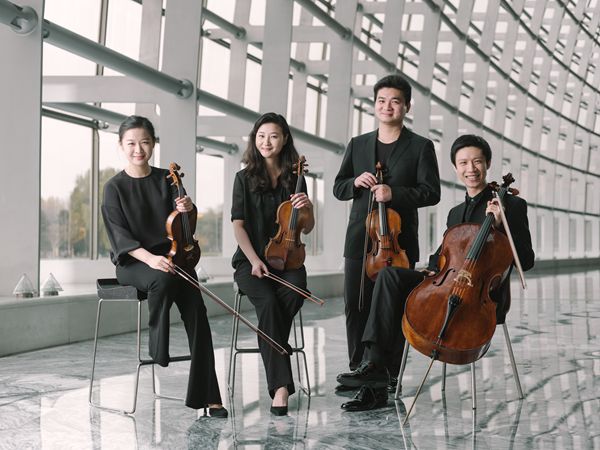 |
|
Members of the Amber Quartet (from left): violinists Ning Fangliang and Su Yajing, viola player Qi Wang and cellist Yang Yichen. All teach at the Central Conservatory of Music. [Photo provided to China Daily] |
Quartet 'plays' famous piece as it educates audiences and broadens the appeal of the musical genre, Chen Nan reports.
The sound of silence to make a loud statement. For a brief period of time, 4 minutes 33 seconds to be precise, on Aug 29, 1952, pianist David Tudor from the United States walked onto the stage in Woodstock, New York, and sat down at the piano, for the world premiere of American avant-garde composer John Cage's work. Its name? You guessed it. 4'33". The piece, if that is the right description, is actually a silent span of 273 seconds. It was to become the most famous and infamous work by Cage.
Fast forward to this month in Beijing. Cellist Yang Yichen and his colleagues that make up the Amber Quartet "played" 4'33" at the National Library Arts Center on July 13.
When the quartet sat still on stage without playing a sound, the audience made their own music as their breathing and whispered comments filled the vacuum. After the allotted time elapsed, the silence was shattered by thunderous applause, when the players stood and bowed.
"I didn't expect the audience tonight to handle the piece so well," said Ning Fangliang, one of the quartet's violinists, after the show.
"4'33" is rarely performed in China since it challenges the audience more than the musicians.
"We were ready to hear disgruntled voices from some of the audience like 'what are they doing onstage?', but instead they broke into rapturous applause. Amazing!"
The audience had been warned; they were not caught unaware. The musicians explained the piece and its meaning before the silent performance.
Before the concert, they introduced and explained the works they would play, or in this particular case, not play.
"John Cage was influenced by Buddhism and I Ching (Book of Changes, a Chinese classic)," Yang said as he addressed the audience before the performance.
"He wanted to encourage people to listen to the sounds around them. Silence is like the number zero, which is actually the most important of all numbers. It adds and enhances rather than stands for nothing."
Besides Cage's 4'33", the quartet also performed Russian composer Dmitri Shostakovich's String Quartet No 8's first movement during the 90-minute concert.
Yang relayed how Shostakovich was influenced by World War II, and how the composer created the work, which they were about to play, in three days (July 12-14, 1960).
The musicians closed the concert with Totem, a string quartet work created by Chinese composer Zhang Chao, who spent two years in his hometown in Southwest China's Yunnan province observing and researching ethnic folk music.
The quartet reached out to the audience and established a bond as they explained each piece of work before performing it.
With background stories of the composers and their pieces, as well as photos, the quartet highlighted the appeal, centrality and emotion of classical music to the audience, especially the younger members.